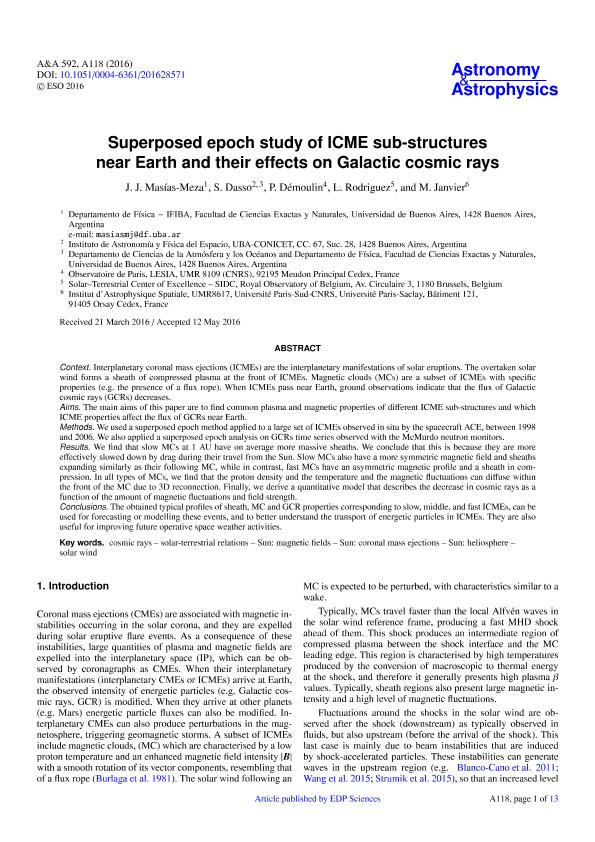Mostrar el registro sencillo del ítem
dc.contributor.author
Masías Meza, Jimmy Joel

dc.contributor.author
Dasso, Sergio Ricardo

dc.contributor.author
Démoulin, Pascal

dc.contributor.author
Rodriguez L.
dc.contributor.author
Janvier, M.
dc.date.available
2019-05-21T18:11:21Z
dc.date.issued
2016-05
dc.identifier.citation
Masías Meza, Jimmy Joel; Dasso, Sergio Ricardo; Démoulin, Pascal; Rodriguez L.; Janvier, M.; Superposed epoch study of ICME sub-structures near Earth and their effects on Galactic cosmic rays; EDP Sciences; Astronomy and Astrophysics; 592; A118; 5-2016; 1-13
dc.identifier.issn
0004-6361
dc.identifier.uri
http://hdl.handle.net/11336/76810
dc.description.abstract
Context. Interplanetary coronal mass ejections (ICMEs) are the interplanetary manifestations of solar eruptions. The overtaken solar wind forms a sheath of compressed plasma at the front of ICMEs. Magnetic clouds (MCs) are a subset of ICMEs with specific properties (e.g. the presence of a flux rope). When ICMEs pass near Earth, ground observations indicate that the flux of Galactic cosmic rays (GCRs) decreases. Aims. The main aims of this paper are to find common plasma and magnetic properties of different ICME sub-structures and which ICME properties affect the flux of GCRs near Earth. Methods. We used a superposed epoch method applied to a large set of ICMEs observed in situ by the spacecraft ACE, between 1998 and 2006. We also applied a superposed epoch analysis on GCRs time series observed with the McMurdo neutron monitors. Results. We find that slow MCs at 1 AU have on average more massive sheaths. We conclude that this is because they are more effectively slowed down by drag during their travel from the Sun. Slow MCs also have a more symmetric magnetic field and sheaths expanding similarly as their following MC, while in contrast, fast MCs have an asymmetric magnetic profile and a sheath in compression. In all types of MCs, we find that the proton density and the temperature and the magnetic fluctuations can diffuse within the front of the MC due to 3D reconnection. Finally, we derive a quantitative model that describes the decrease in cosmic rays as a function of the amount of magnetic fluctuations and field strength. Conclusions. The obtained typical profiles of sheath, MC and GCR properties corresponding to slow, middle, and fast ICMEs, can be used for forecasting or modelling these events, and to better understand the transport of energetic particles in ICMEs. They are also useful for improving future operative space weather activities.
dc.format
application/pdf
dc.language.iso
eng
dc.publisher
EDP Sciences

dc.rights
info:eu-repo/semantics/openAccess
dc.rights.uri
https://creativecommons.org/licenses/by-nc-sa/2.5/ar/
dc.subject
Cosmic Rays
dc.subject
Solar Wind
dc.subject
Solar-Terrestrial Relations
dc.subject
Sun: Coronal Mass Ejections
dc.subject
Sun: Heliosphere
dc.subject
Sun: Magnetic Fields
dc.subject.classification
Astronomía

dc.subject.classification
Ciencias Físicas

dc.subject.classification
CIENCIAS NATURALES Y EXACTAS

dc.title
Superposed epoch study of ICME sub-structures near Earth and their effects on Galactic cosmic rays
dc.type
info:eu-repo/semantics/article
dc.type
info:ar-repo/semantics/artículo
dc.type
info:eu-repo/semantics/publishedVersion
dc.date.updated
2019-05-14T21:36:32Z
dc.journal.volume
592
dc.journal.number
A118
dc.journal.pagination
1-13
dc.journal.pais
Francia

dc.journal.ciudad
Paris
dc.description.fil
Fil: Masías Meza, Jimmy Joel. Universidad de Buenos Aires; Argentina
dc.description.fil
Fil: Dasso, Sergio Ricardo. Consejo Nacional de Investigaciónes Científicas y Técnicas. Oficina de Coordinación Administrativa Ciudad Universitaria. Instituto de Astronomía y Física del Espacio. - Universidad de Buenos Aires. Facultad de Ciencias Exactas y Naturales. Instituto de Astronomía y Física del Espacio; Argentina
dc.description.fil
Fil: Démoulin, Pascal. Centre National de la Recherche Scientifique; Francia
dc.description.fil
Fil: Rodriguez L.. Royal Observatory Of Belgium; Bélgica
dc.description.fil
Fil: Janvier, M.. Universite de Paris 13-Nord; Francia
dc.journal.title
Astronomy and Astrophysics

dc.relation.alternativeid
info:eu-repo/semantics/altIdentifier/doi/http://dx.doi.org/10.1051/0004-6361/201628571
Archivos asociados
